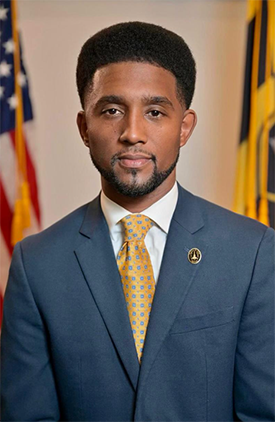Baltimore Mayor Brandon M. Scott, along with Baltimore County Executive John Olszewski Jr., recently expressed concerns over the date set for the primary election in April of 2024, citing the fact that it will coincide with Passover. In separate letters addressed to Senate President William Ferguson and Speaker of the House Adrienne Jones, they encouraged the General Assembly to act to reschedule the election so members of the Jewish community will be able to vote without violating Jewish law.

As of Monday, Feb. 27, the presiding officers have acknowledged the mayor’s letter and agreed to work with the State Board of Elections and local election offices to reschedule the election so it does not interfere with Passover, though an exact date has not been set.
For many Jewish people, Passover is a holy period during which working is discouraged. Voting would count as working in that case, so Baltimore-area Jews would be faced with the decision of whether exercising their democratic right to vote is worth disobeying Jewish law.
Not only that, but the April 2024 primary is set to take place in Northwest Baltimore, which houses a large community of Orthodox Jews. Areas like the Pikesville, Owings Mills and the Upper Park Heights neighborhoods boast a significant Orthodox population. According to a 2020 study conducted by Brandeis University’s Cohen Center for Modern Jewish Studies, 21% of Jewish adults in the Baltimore area identify as Orthodox, making them the most common denomination in the area’s Jewish community.
“The mayor has layered his entire administration to see things through a lens of equity,” said Marvin James, Mayor Scott’s senior advisor. “Baltimore would be impacted by having the election on that date because we have a large Orthodox Jewish community, and a large Jewish community, period.”
James elaborated that religious leaders brought this issue to the mayor’s attention during a monthly city hall meeting, where people representing religious entities in the Baltimore area were able to express their concerns and make suggestions with the aim of making Baltimore a more religiously inclusive community.
“When we became aware of that April conflict, we shared it with some legislators here in Annapolis knowing that it would impact a lot of voters in Baltimore city and Baltimore county,” said Howard Libit, executive director of the Baltimore Jewish Council. “Both the mayor’s office and the county executive’s office realized that this would impact a lot of Jewish voters in their jurisdictions.”
A community this large being unable to vote would be problematic not only for them, but for the primary’s candidates — with a large part of Baltimore’s community being absent from the voting pool due to religious obligations, the election’s results would not fully represent the interests of the city’s population. Libit also noted District 5 councilman Isaac “Yitzy” Schleifer, who is Orthodox himself, and thus would be unable to campaign on Election Day were the date not changed.
Typically, an election’s date cannot be changed without a motion by the General Assembly. Exceptions can be made in the case of a pandemic emergency or the redistricting of voting districts, but in this case, legislative support would be required to reschedule this preplanned date.
James noted that such an occurrence is a rarity, and there have not been many cases of an election coinciding with a religious holiday in the past.
“Elections throughout the state are set by the state board of elections,” he explained. “As someone who is on the political side of things, this day should have been reviewed to see whether or not it meshed with the holy days of any religious groups.”
He added that for the past several years, the Baltimore City primary has taken place in June or July. The 2024 election will be the first time in a while that an election has been set for April.
“On my first day of the administration, I directed every single person to operate with a lens of equity,” Scott said. “Voting is a democratic opportunity that every person should be able to participate in regardless of religion or color. I wrote that letter as someone who truly supports our Jewish community in the city of Baltimore and believes in equal access to the ballot box.”







